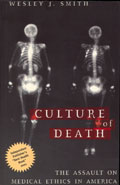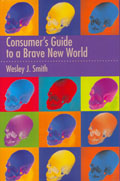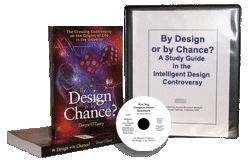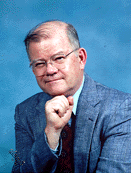
Access
Research
Network
|
|
Access |
ARN-Announce is the on-line announcement and information service of Access Research Network. ARN generates announcements to the current ARN Announce list as information becomes available. You have received this message because your email address was submitted to this list. Subscription and Unsubscription information is at the end of this message.
Click here for a text-only version of this document.
IN THIS ARN-ANNOUNCE:
Ideas have consequences. That was the title of Richard Weaver's 1948 book which opened with this observation: “Every man participating in a culture has three levels of conscious reflection: his specific ideas about things, his general beliefs or convictions, and his metaphysical dream of the world.” The primary focus at ARN is on the Darwin vs. Design debate, but the reason we think it is such an important debate is because these are powerful ideas that have consequences in many other areas of life. Bioethics is one such area we would like to focus on in this month’s newsletter. What is the underlying ‘metaphysical dream of the world’ that was driving the decisions of those involved in the Terri Schiavo case? For the most part they remain unstated, but like a CSI forensic scientist we can piece together the clues with the help of our featured authors Jim Reitman and Wesley Smith to get a pretty good picture.
Perhaps more painful than any other object lesson to emerge out of the life and death of Terri Schiavo is this recurring realization: Once end of life controversies are relegated to the courts, all the colorful subtleties that comprise meaningful life making it worth pursuing, are bleached white by the caustic chlorine of the ethic of radical individualism, and its derivative Contractual Model of decisionmaking upon which both the courts, and increasingly the medical profession, lean all too heavily. It has become obvious over the last 40 years in a succession of legal controversies over the so-called “end of life” issues that the god of personal autonomy has now bullied its way into medicine and has all but totally extinguished the ethics of care.
Our featured author, Jim Reitman, has tackled three such “end of life” dilemmas in a series of articles promoting a rational alternative to the Contractual Model of decisionmaking, a Wisdom Model based on precepts found in Old Testament wisdom literature. Drawn from the books of Job and Ecclesiastes, the Wisdom Model reveals that ambiguity is the rule rather than the exception in “end of life” decisionmaking, and the added pain and disillusionment of suffering while life remains, typically makes a travesty of ethical individualism and the Contractual Model of decisionmaking: Personal preferences expressed in the face of uncertainty are “held hostage” by the pain of suffering and the contagion of despair. Such preferences are thus bedeviled by ambivalence and jeopardize true community and care. The Wisdom model looks suffering and ambiguity squarely in the face to reveal how these counterparts of suffering induce our profound disillusionment with self-sufficiency and draw our attention away from our own demands and toward a larger design for our lives. Such Wisdom cannot help but restore true community and care to end of life decisionmaking.
The first article deals with the issue of Physician Assisted Suicide and exposes how the radical individualism underlying recent legal precedence in end of life cases has insidiously emasculated the medical profession by ignoring moral deliberation, and eliminating the prerogative of true care and advocacy in end of life scenarios that come to the courts’ attention. The article makes it clear why the next step to Court Assisted Suicide in the Schiavo case was such a short step, revealing how both due process and equal protection for the medically disabled were trampled by the radical individualism that has imbued the “death with dignity” movement with such power that determines the outcome in such cases.
The second article tackles the dilemma of Medical Futility and exposes how the premise that advance directives can truly preserve autonomous choice has really become the “emperor with no clothes.” Even conservative theists have been hoodwinked into believing that Advance Directives, including the Durable Power of Attorney for Healthcare, can really protect the wisdom of community and care against the incursions of legally sanctioned radical autonomy. The Wisdom model illuminates why neither Schiavo’s parents, nor the governor of Florida, nor the medical profession (in their futile attempt to physiologically define the limits of meaningful life), nor the President, nor the Congress of the United States could withstand even the most tenuous and ambiguous of presumptive “previously expressed preferences.” The article also reveals why the very notion of expressed preferences is itself fatally flawed by the ambiguity and uncertainty that typically characterizes end of life decisions.
The third article exposes the deceptive and deadly philosophical underpinnings of the rationale for Partial Birth Abortion as a legitimate solution to the agonizing anguish of Fatal Congenital Anomalies discovered in utero by genetic testing. By revealing how the rationale itself is fatally flawed even in this seemingly logical and acceptable way to mitigate the suffering of bearing a doomed pregnancy to term, the article uses the Wisdom Model to subvert the rationale for abortion in any case, possibly excepting clear and present danger to the life of the mother (as in ectopic pregnancy).
 Together, these three articles provide a sound rationale to question radical autonomy as ever constituting an adequate or legitimate basis for finding lasting meaning in so-called “end of life” dilemmas. The Wisdom Model provides a rational template to surface the issues that truly contribute to lasting meaning, and to develop the circle of community that helps discover that meaning over time, as disillusionment and the pain of suffering give way to redemptive purposes in that suffering.
Together, these three articles provide a sound rationale to question radical autonomy as ever constituting an adequate or legitimate basis for finding lasting meaning in so-called “end of life” dilemmas. The Wisdom Model provides a rational template to surface the issues that truly contribute to lasting meaning, and to develop the circle of community that helps discover that meaning over time, as disillusionment and the pain of suffering give way to redemptive purposes in that suffering.
Dr. Jim Reitman, MD, MA, has been an internal medicine specialist in the U.S. Air Force since 1990 and is currently stationed at the United States Air Force Academy in Colorado Springs. He served as Chief Consultant for Medical Ethics to the Air Force Surgeon General From 1995-1998 and has published a number of articles and book chapters exploring the process of decision making in common ethical dilemmas of end-of-life care.
 When his teenaged son Christopher, brain-damaged in an auto accident, developed a 106-degree fever following weeks of unconsciousness, John Campbell asked the attending physician for help. The doctor refused. Why bother? The boy’s life was effectively over. Campbell refused to accept this verdict. He demanded treatment and threatened legal action. The doctor finally relented. With treatment, Christopher’s temperature subsided almost immediately. Soon afterwards he regained consciousness and today he is learning to walk again.
When his teenaged son Christopher, brain-damaged in an auto accident, developed a 106-degree fever following weeks of unconsciousness, John Campbell asked the attending physician for help. The doctor refused. Why bother? The boy’s life was effectively over. Campbell refused to accept this verdict. He demanded treatment and threatened legal action. The doctor finally relented. With treatment, Christopher’s temperature subsided almost immediately. Soon afterwards he regained consciousness and today he is learning to walk again.
This story is one of many Wesley J. Smith recounts in his award winning book, Culture of Death: The Assault on Medical Ethics in America. Smith believes that American medicine “is changing from a system based on the sanctity of human life into a starkly utilitarian model in which the medically defenseless are seen as having not just a ‘right’ but a ‘duty’ to die.” Going behind the current scenes of our health care system, he shows how doctors withdraw desired care based on Futile Care Theory rather than providing it as required by the Hippocratic Oath. And how “bioethicists” are influencing policy to consider whether organs may be harvested from the terminally ill and disabled, whether cognitively disabled patients should be dehydrated to death by having their tube-supplied food and water withheld, and whether animals should receive greater protection in medical experiments than people.
Wesley J. Smith has spent years researching these issues and he makes his case in a passionate, rational, and well documented fashion. This book is an ideal introduction to critical issues regarding medical ethics for the general audience. Those who want to delve further into the issues will be skillfully guided by the 538 references carefully documented by the author.
What people are saying about Wesley J. Smith’s Culture of Death:
The best survey of utilitarian bioethics written for a general audience that I have seen yet. I highly recommend Culture of Death: The Assault on Medical Ethics in America by Wesley J. Smith. You will find it more hair-raising than any novel you’ve read. -- Dean Koontz, author
Smith argues that American medicine has replaced a time-honored sanctity of life with a grim utilitarian model in which the medically defenseless have not just a right, but a duty, to die. -- The New York Times
Culture of Death is a book any American should buy, read and discuss with family, friends and neighbors. It is a call to action. -- Physicians for Compassionate CareOrder your copy now of the book that received the Independent Publisher’s “Best Health Book” award Culture of Death: The Assault on Medical Ethics in America.
 Cloning researchers claim to have cloned an embryo that is mostly human, but also part animal. Biotech companies brag about manufacturing human embryos as "products" for use in medical treatments. Echoing long discredited master-race thinking, James Watson, who won a Nobel Prize for co-discovering the DNA double helix, claims that genetically enhanced people will someday "dominate the world."
Cloning researchers claim to have cloned an embryo that is mostly human, but also part animal. Biotech companies brag about manufacturing human embryos as "products" for use in medical treatments. Echoing long discredited master-race thinking, James Watson, who won a Nobel Prize for co-discovering the DNA double helix, claims that genetically enhanced people will someday "dominate the world."
Events are moving so fast--and biotechnology seems so complicated--that many of us worry that we can't have an informed opinion about these issues that are remaking the human future before our very eyes. But now Wesley J. Smith provides us with a guide to the brave new world that is no longer a figment of our imagination but right around the corner of our lives.
Smith starts with the basic questions. What are stem cells? What is the difference between embryonic stem cells and adult stem cells, and which is most promising for medical therapy? What does embryonic stem cell research involve and why is it so controversial? What is its relationship to human cloning?
In addition to explaining the science of stem cells, this highly readable and carefully researched book reports on the gargantuan "Big Biotech" industry, and its supporters in the universities and science and bioethics establishments. Smith shows how this lobby works and how the lure of huge riches, mixed with the ideology of "scientism," threatens to impose a "new eugenics" on society that would dismantle ethical norms and call into question the uniqueness and importance of all human life.
Consumer's Guide to Brave New World presents a clear-eyed vision of two potential futures. In one scenario we will use biotechnology as a powerful tool to treat disease and improve the quality of our lives. But in another, darker scenario, we will be steered onto the anti-human path Aldous Huxley, and other prophetic writers, first warned against fifty years ago when science fiction had not yet become science fact.
About the Author:
Attorney Wesley J. Smith is the author or coauthor of 11 books. His writing and opinion columns have appeared in such national and regional news publications as Newsweek, the New York Times, the Weekly Standard magazine, National Review, the Wall Street Journal, USA Today, the New York Post, First Things, Forbes magazine, the San Francisco Chronicle, and the Detroit News among many others. Smith has appeared internationally on the electronic media, including such programs as CNN Crossfire, Larry King Live, Good Morning America, Nightline, and the Sunday Program on BBC 4 radio. In May 2004, National Journal named Smith one of the nation’s top expert thinkers in bioengineering because of his work in bioethics.
Wesley J. Smith, a senior fellow at the Discovery Institute, is an attorney and consultant for the International Task Force on Euthanasia and Assisted Suicide and a special consultant to the Center for Bioethics and Culture. He is an international lecturer and public speaker, appearing at political, university, medical, legal, bioethics, and community gatherings across the United States, Canada, Europe, South Africa, and Australia.
Order your copy of Wesley J. Smith’s newest book Consumer’s Guide to a Brave New World.
 Last October we announced our ID Boot Camp training manual: the By Design or By Chance Study Guide to accompany Denyse O’Leary’s book by the same name. This month we are beefing up the Boot Camp with over 200 pages of questions and answers on CD that can be used as reading comprehension questions, homework assignments, or tests (open or closed book).
Last October we announced our ID Boot Camp training manual: the By Design or By Chance Study Guide to accompany Denyse O’Leary’s book by the same name. This month we are beefing up the Boot Camp with over 200 pages of questions and answers on CD that can be used as reading comprehension questions, homework assignments, or tests (open or closed book).
These questions were prepared by Claude LeBlanc for a course he teaches at Don Bosco Technical Institute in Rosemead, California. He found O’Leary’s book ideally suited for his high school students and he developed these questions, divided into 23 assignments, to help his students master the material in the book.
O’Leary’s book has been hailed as one of the most readable and balanced treatments of the Darwin vs. Design debate for the general audience. The ARN study guide provides the homeschool instructor or classroom teacher all the tools needed to turn the book into a 10 week short course or a year-long extended study. With the addition of Claude LeBlanc’s 200+ pages of questions and answers on CD, the Study Kit can now be tailored for almost any individual study or teaching situation. The CD is only available with the Study Guide, but if you have already purchased the Study Guide, contact our office and we can ship you a copy for $10 which includes shipping and handling. You can also view a sample reading assignment from the new CD.
 It was nice to see Phillip Johnson back in print with his column in the March issue of Touchstone Magazine. His column is a review of Mark Twain’s neglected classic Joan of Arc. After I read his column I went out and found a copy of the book at a used bookstore, and I must say, it was one of the most entertaining and inspiring books I’ve read in awhile. Mark Twain considered it the best work of his career. The critics disagreed because it was so unlike anything else he had written, as it is based more on a creative repackaging of historical court records than his satirical imagination.
It was nice to see Phillip Johnson back in print with his column in the March issue of Touchstone Magazine. His column is a review of Mark Twain’s neglected classic Joan of Arc. After I read his column I went out and found a copy of the book at a used bookstore, and I must say, it was one of the most entertaining and inspiring books I’ve read in awhile. Mark Twain considered it the best work of his career. The critics disagreed because it was so unlike anything else he had written, as it is based more on a creative repackaging of historical court records than his satirical imagination.
Read Phil’s column and then go find a copy of the book to add to your summer pleasure reading.
All of the ARN products can be ordered through our web catalog store with secure credit card ordering. There you will find a description of each product and you may add as many products as you would like to the electronic shopping cart. The suggested donation for each item includes USPS Media Mail for North American orders, which typically arrive in 5-7 days. Overseas prices include Foreign Surface shipping which may take 4-8 weeks. For faster shipping please include an additional donation and request either USPS Priority or Foreign Air. If you provide your email address, you will receive an email receipt of your order. Place your order today online at www.arn.org (click the products links on the top menu bar). If you have any problems or questions, or would rather place your order by phone, call our toll free number at 1-888-259-7102 and our staff will be happy to assist you (or leave your order with our voice mail system if we are out of the office).
ARN-Announce describes many of the upcoming events and new articles, books, videos and other resources on Intelligent Design. Please forward this message to several of your friends and colleagues to let them know about the resources available at Access Research Network (www.arn.org). Back issues of ARN-Announce can be found at www.arn.org/announce.htm
ARN-Announce is produced by Dennis Wagner (dwagner@arn.org)
Access Research Network is a non-profit organization dedicated to providing accessible information on science, technology and society issues from an Intelligent Design perspective.
Mailing Address:
Access Research Network
PO Box 38069
Colorado Springs, Colorado
80937-8069
Contact:
(719) 633-1772 voice
(719) 520-1241 fax
(888) 259-7102 toll-free order line
On the web:
www.arn.org
TO ADD YOURSELF TO ARN-ANNOUNCE:
Send an email to "ARN-Announce-request@arn.org".
The body of the message should consist of the word "SUBSCRIBE"
and nothing else. Or visit the web page at www.arn.org/announce.htm
and select Subscribe and enter your email address. You will receive
a confirmation email indicating your name has been submitted to the
list. Follow the directions and reply to the email and your email address
will be added to the ARN-ANNOUNCE list.
TO REMOVE YOURSELF FROM ARN-ANNOUNCE:
Send an email to "ARN-Announce-request@arn.org".
The body of the message should consist of the word "UNSUBSCRIBE"
and nothing else. Or visit the web page at www.arn.org/announce.htm
and select Unsubscribe and enter your email address. Your email
address will be automatically removed from this list.
Copyright 2005 Access Research Network. All rights reserved. International copyright secured.
04.28.05